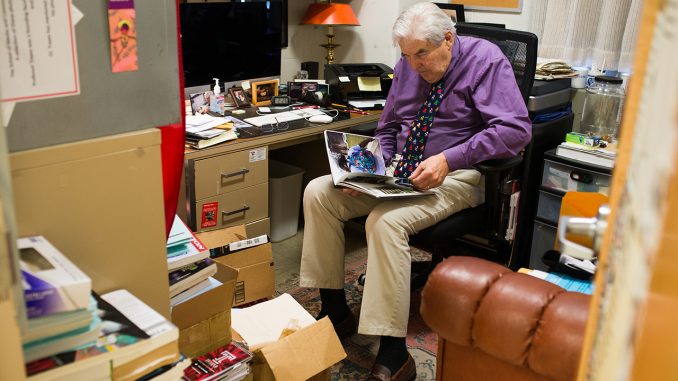

The Friday before spring break of my junior year, I hit my breakpoint.
A breakpoint usually occurs when someone is drowning. It is the moment a person can no longer physically hold their breath and cannot resist the urge to inhale.
Growing up in New Jersey — about five minutes from the beach — near-drowning experiences were common in my childhood. The experience of being sucked below the waves until my head spun and heart pounded was almost a rite of passage.
But it wasn’t until college that I experienced a different kind of drowning — life was kicking my ass.
I was lost. The passion that drove me through my first two years of college had faded at some point in the prior months, and I was drowning in my lack of purpose.
At the time, I was enrolled in my first photojournalism class taught by Edward Trayes and Sarah Fry. I didn’t think much about photojournalism until that point, and certainly did not picture myself pursuing it as a career. Trayes taught me to love and value the connections I made between my subjects and my camera in photography. The class was one of the only places where I felt like I had my head above water.
But that Friday, when Dr. Trayes asked me the simple question, “Do you know how well you’re doing?” I burst into tears.
Unable to hold in the waves of my emotions, everything I was struggling with poured out.
He was the last person I expected to confide in — I respected Dr. Trayes, but saw him as professional, gruff and reserved. But our conversation was the first time in months I felt more air in my lungs than water.
I shared the things that were making it so hard to stay afloat and he listened. I told him how I planned to withdraw from the semester. After trying to convince me how much I needed to stay, he made me promise to come back and finish the course with him over the summer.
I saw the father in him that day. He asked me if I was hungry, if I was financially stable, if I needed anything at all. He told me he would help me piece together my life again.
This is the side of Dr. Trayes available to any student in need if they take the time to get to know him outside of a classroom.
He is equally authentic and honest — two qualities I believe are crucial for all educators. It’s not always obvious which students desperately need support. But checking in with students, taking the time to listen to them, helping them find a voice and directing them to the resources they need can save people from drowning. They are essential actions and things Dr. Trayes did for me.
Dr. Trayes is retiring at the end of this year, after 52 years as a professor at Temple. He taught me to slow down to view the world around me and to see possibility in everything. Because of him, I look for light everywhere — not only through the viewfinder of my camera but also as a human trying to make sense of the world.
For more than 50 years, Dr. Trayes has touched the lives of nearly every photojournalist to walk the halls of Annenberg Hall. He has shaped an entire generation of visual journalists with his thorough, and yes sometimes harsh, way of teaching the craft. Yet, I wouldn’t change a thing.
Photojournalism is the life preserver I never knew I needed. When I first picked up a camera, it felt like home, and I haven’t put it down since.
Thank you, Dr. Trayes, for what you’ve done for me and so many others.
While this piece touches mostly on my relationship with Dr. Trayes, I cannot rightly finish it without offering a very special thank-you to Sarah Fry. In the time that I’ve known Sarah, she remains a consistent source of joy, comfort, friendship, warmth, guidance and laughter in my life. She is incredibly dedicated to her students and puts in countless hours to ensure that they reap the most benefits from the courses she teaches. I’ve seen the admiration that she evokes in each person she teaches during my time working in the Klein School for Media and Communication’s photo lab.
It is a running joke in the photo program that we resemble each other. I suppose dark hair, bangs, glasses and an ardent love for long skirts automatically makes us twins. But even when it is said in jest, I value this comparison. Sarah, you are a light, and any of the places that your life may take you are implicitly better because of your presence.
I also want to thank professors Jillian Bauer-Reese, Soomin Seo, Larry Stains, Maida Odom, Saleem Ahmed, Meredith Edlow, Logan Molyneux and Ms. Rosalind Williams — the backbone of the Journalism Department — for helping me keep my head up. Each of you offered me incredible kindness that played an integral role in my road to graduation. Your empathy, understanding and support will always have a place in my heart.
As Dr. Trayes likes to say, “Keep in touch.”



Dr. Trayes had a profound impact on my life and career! May he have many long and healthy years of retirement.